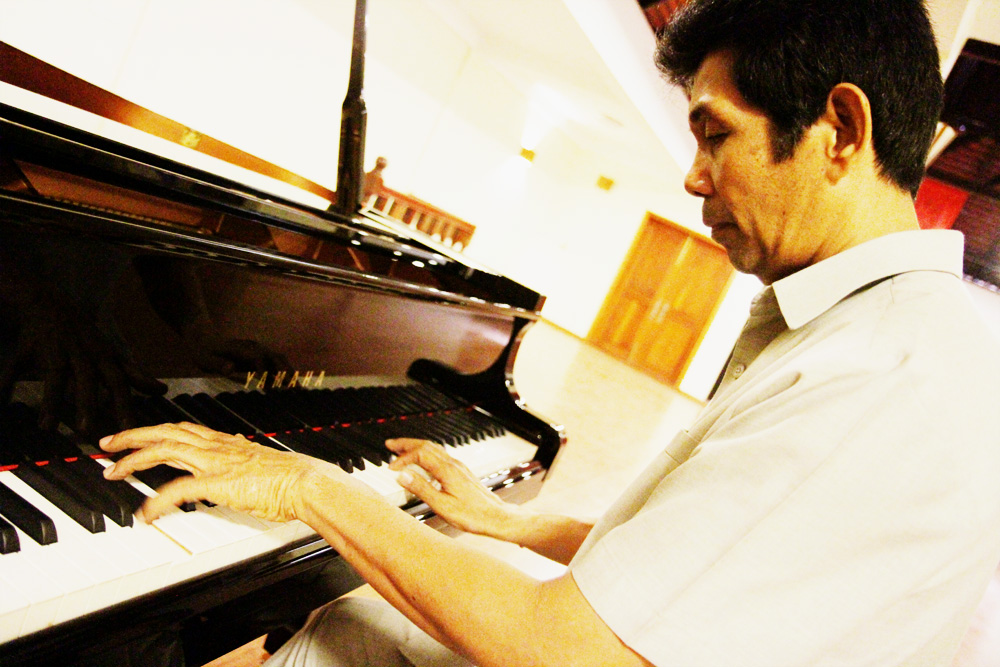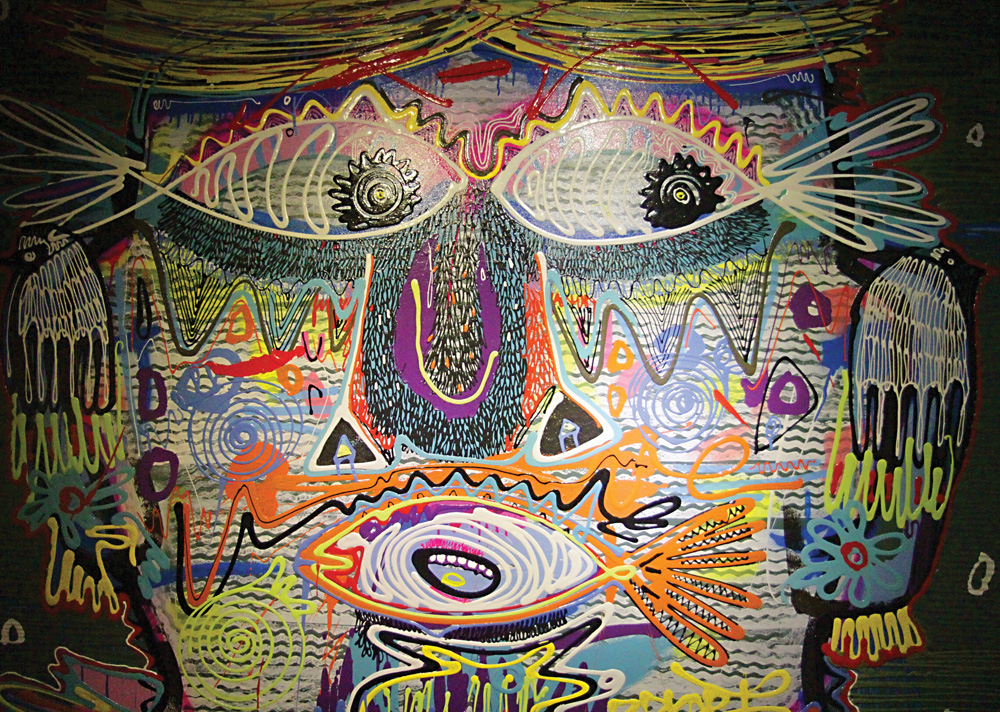Dr.Him Sophy is leading the way up four flights of stairs to his personal concert hall. The room would host 150 people if he had the chairs, but for now, the auditorium remains one of the musicians countless works in progress.
Born in Prey Veng in 1963, Him Sophy represents the country’s lone musical composer. And while his name is still relatively obscure (for now, at least), his music has helped define nearly every notable creative endeavour to originate from the Kingdom over the last several years.
He scored the critically acclaimed Where Elephants Weep, the rock opera by John Burt and Arn Chorn-Pond. Sophiline Cheam Shapiro tapped him for the music to her 2013 dance drama, A Bend in the River. In addition to Shapiro’s dance, Dr. Sophy’s Pamsukula made headlines at Seasons of Cambodia, the 2013 festival in New York celebrating contemporary Cambodian arts. He is currently collaborating with Rithy Panh, the renowned film director, on a new project.
International exposure and critical acclaim, however, do not always bear in their wake local fame or great riches. His modest Phnom Penh music hall straddles a mid-sized duplex in Toul Kok that he shares between his home and music school. “I am only a composer,” he says. “But even if I am not a millionaire or a banker or something, I feel like I do many things for Cambodia.”
Surviving the genocide and witnessing the collapse of the Soviet Union, where he obtained his PhD in composition, does not a lazy man make. At 9am on New Year’s day he is at school working. The students and his classes are what keep him afloat, but they are not without cost. His first true love, the piano, is often stranded on the wayside of treble clefs, students and family.
But not today. In a rare break from his churning creativity, Dr. Sophy sits and pours through a dozen or so flawless stanzas of Tchaikovsky and classic French compositions before moving on to Dave Brubeck’s Take Five. The master and his most prized possession reverberate in unison. His eyes rise and fall, his chest heaves as his fingers race across the ivories. His listeners are not exempt from the exercise: guess the chef d’oeuvre.
He stops and laughs. “It’s not easy,” he says.
The composer might be talking about the concerto, a notoriously challenging piece, or the rather obvious logistical question of how one goes about getting a 300-kilogram piano up four flights of narrow stairs. His simple manner is disconcerting, but the sub-current of existential commentary on the Cambodian condition is undeniable.
THE MEMORIES
Him Sophy was 12 years old when the Khmer Rouge captured Phnom Penh and forced his family to return to their native province of Prey Veng. From the suffering, the hunger, the pain, he has extracted variations and allegros to remember that which has been lost. And in doing so, he may have created his life’s defining work: Memory From Darkness, a 25-minute piece written for the violin, cello and piano.
Him Sophy was a student at the Tchaikovsky Moscow State Conservatory when he wrote Memory From Darkness in 1990. The wounds were still fresh in those days, barely a decade removed from Pol Pot’s atrocities. His music represents one of the country’s earliest attempts to face its horrific past.
Haunting, intensely personal and profoundly human, the composition has only twice been performed publicly. The first time occurred during a series of concerts in Phnom Penh in July 2013, when the New York New Music Ensemble recorded the piece in collaboration with Cambodia Living Arts, a local non-profit that supports music and art. The last was a recital given by his students in his fourth-floor auditorium the Sunday before Christmas. It was a poignant performance celebrating the long-awaited release of Memory From Darkness on CD, nearly 25 years after its conception.
The Advisor recently sat down with Dr. Sophy to discuss Memory From Darkness, the state of classical music, and the delicate balancing act of honouring tradition while pushing creative boundaries.
You composed Memory From Darkness in 1990, when you were a student. It was first played publicly in 2013 by the New York New Music Ensemble. Why did it take so long for it to come to the public?
Memory From Darkness was composed for my exam at the Conservatory. There was one recording, but it was not good. There was lots of noise, but I still kept it and brought it to Cambodia. In the beginning, it was not easy to know who would play my music. Nobody played these instruments well. Even now, I tried to test Cambodian violinists and cellists for the launch on December 21st, but they could not play it. Their technique is still very limited.
Memory From Darkness is a really difficult piece, and it’s from the heart. The technique is very high. That’s why nobody ever performed it here. It was only through the support of Cambodian-American composer Chinary Ung, who is actually coming next month, that it could happen. He came to Cambodia with his ensemble and then had the idea, “Oh, I want to support Him Sophy because his pieces, many pieces, were only performed a long time ago.” That’s why the New York New Music Ensemble came with him in 2013.
Why do you stay in Cambodia if you cannot find musicians who can play your music?
Many people go outside. I went to the United States. I finished my PhD in Moscow and came back to Cambodia. I wanted to express my feelings. That is why I chose to stay in Cambodia. I feel like the world is round for me. I don’t feel nationality. I don’t feel different. I can live anywhere. I can stay anywhere. In Cambodia, if I want to play Western music, I can. When Sophiline Shapiro commissioned me to compose music for A Bend in the River, I composed music from the Angkorian period. From Angkor until now, no one composed this music. But I am composing new pieces of this ancient culture. It’s like a battle between a human and a crocodile. I had to find a balance: not too different, but not too easy, either, otherwise they never learn.
It’s a Russian professor who told you to come back to your roots as part of your composition. Had he not pushed you back toward your origins, would your music be more European?
Maybe. Maybe not. Sometimes it depends on the student. If the student doesn’t want to continue from their own roots, it’s okay. Nobody is forced. Of course, I learned a lot of Western techniques. I learned them all. But Khmer culture is brave. I think we continue to learn and improve. Our music is not bad. But techniques like polyphony and harmony in orchestration come from the West. We can say that without Western culture, it would be hard to develop our own root culture. That’s true. But that’s globalisation and cultural diversity.
So you composed a Cambodian rock opera?
A rock opera, yes! No one believed I could do it, not even the American musicologists. From the beginning, they said it would never come out. They did, yeah, because I used traditional Cambodian instruments to accompany an opera, and there are a lot of traditional Cambodian instruments. Thirty-seven traditional instruments combined with a rock band — electric guitar, electric bass, piano, synthesizer — it took me eight years to complete it. I think many people around me ran away because they couldn’t survive from the small money. It was big, huge work, but little money.
And there is a lot to say about that opera. There are still many dissertations you could write about that opera, because there are a lot of secrets inside. But in Cambodia, no one knows that much about opera because the knowledge is still limited. Now, the younger generation, they are trying, they are starting to understand. That’s why in my opera I used a lot of traditional Cambodian instruments and a rock band, because I could not find the right cellist here. It was a new musical genre, something nobody ever did before. That’s why it took such a long time.
How would you assess Cambodian creativity in 2015?
We have good contemporary dance. First, I think of Amrita Performing Arts and the Sophiline Arts Ensemble. Cambodia Living Arts also gives very big support to traditional music and dance. But it seems like it’s the private sector where things are growing and developing the fastest. In the aspect of music and composing, I think it’s only me, and maybe also my students, but they are still not ready to compose symphonies just yet.
What do you have planned next?
There are a lot of opportunities, but how to choose? Right now, they are waiting for my music for Requiem For Cambodia. That’s a huge project. We are collaborating with a very famous Oscar-nominated Cambodian filmmaker, Rithy Panh. He has joined me on the Requiem project. He will make the film for my music.
Also, well, it’s sort of a secret, but I’ll tell you: I am working on a new musical combining traditional Cambodian styles and modern dance. Sometimes, when I think about how to survive as an artist, I think maybe I need to come back and create a musical that is less complicated, that can serve the people more.


